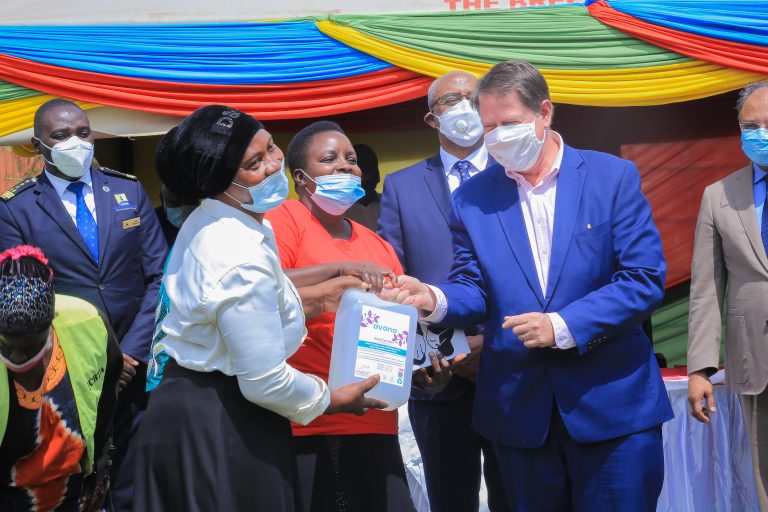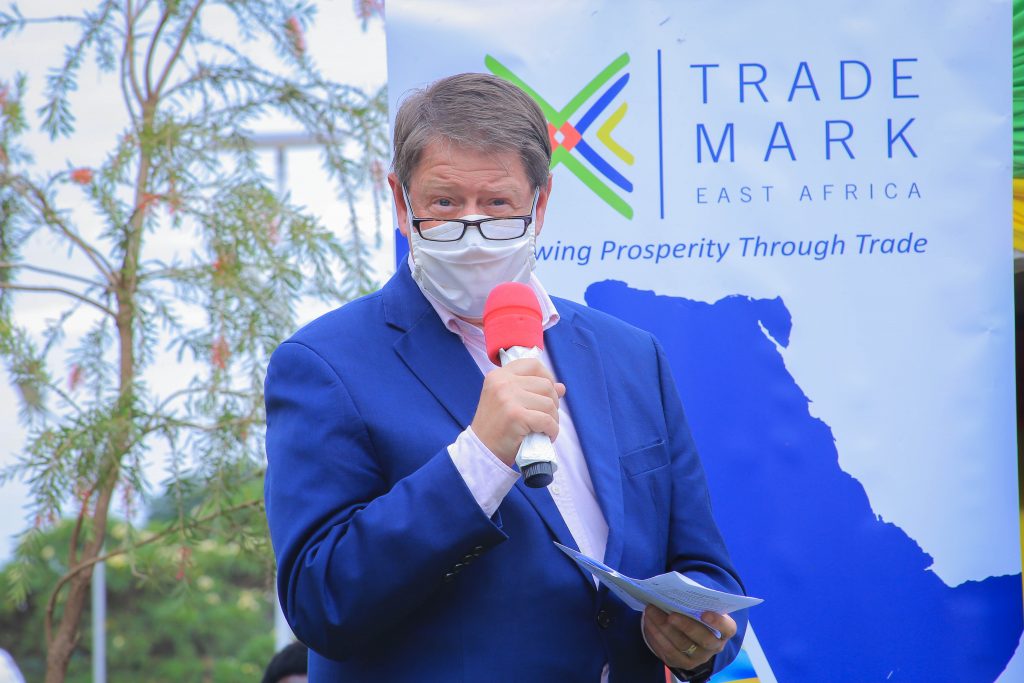
Our Reporter.
Over the years, TradeMark East Africa has been investing billions into trade facilitation infrastructure such as one stop border posts, roads and electronic cargo tracking and clearing systems, among others.
However, since the outbreak of Covid-19, a lot has happened and TradeMark has had to pay more attention to ensuring safe cross border trade for all.
For instance, TradeMark East Africa in May 2020 created a $23m Safe Trade Emergency Facility to support governments across the region to undertake critical measures along the transport and trade routes to ensure continued trade.
In this candid interview, Frank Matsaert, the TradeMark East Africa chief executive officer decodes the Safe Trade Emergency Facility (STEF) and TradeMark EA’s continued support to fragile countries like South Sudan, Burundi and Democratic Republic of Congo and more.
What is this $23m Safe Trade Emergency Facility?
We thought of an emergency programme that sought to support eastern and southern African governments to implement containment measures against Covid-19 and trade resiliency. This is being undertaken alongside scaling existing programmes to capitalise on emerging opportunities that build the region’s socio-economic resilience.
The programme supports trade continuity in a safer manner through short and medium term interventions that are critical for resumption of economic activity, food security and social stability, jobs and economic recovery.
As a region, we have seen near or total collapse of some regional value chains, affecting both imports and exports. Covid-19 has created problems, congesting borders with cargo trucks tailing back to tens of kilometres while some traders had to shut down business as a result of various restrictions.
Therefore, we needed to put in place a number of interventions and as a result, we are seeing resumption of cargo movements across borders, improved coordination in introducing Covid-19 measures and adoption of innovative solutions for real time exchange of Covid-19 certificates to confirm authenticity.
What area does the facility cover?
The Safe Trade Emergency Facility has been developed to cushion trade and people within East Africa with key objectives of making ports, borders and critical supply chains safe for trade as well as ensuring food security and access to critically required medicines and supporting measures to prevent job and income losses.
The programme has actually grown to a $23m and is being implemented under seven clusters; supporting emergency personal protective equipment and testing, trade technology interventions, which include the regional cargo and driver tracking system, trade policy interventions, supply chain support, standards and sanitary and phyto-sanitary projects, private sector advocacy interventions and gender inclusion, women in trade and safe zones.
The programme has recorded some successes such as provision of personal protective equipment to frontline staff and traders at ports, borders and inland container depots in Uganda, Burundi, DR Congo, Ethiopia, Kenya, Malawi, Rwanda, Somaliland, South Sudan, Tanzania and Zambia.

What has been the impact of Covid-19 on trade in the eastern Africa region?
The impact has been in varying proportions. In the first few months of Covid-19, horticulture, floriculture and tourism declined by close to 70 per cent on account of restrictions in Europe and North American markets. The situation then began to improve in the second half of 2020, but most countries in the region are yet to recover fully.
Manufacturing and cross-border trade also took a major hit as the disruptions at markets and raw material sources, shutting of borders and airports and declining incomes all contributed to reduce production output.
We also witnessed a decline of consumption as households prioritised essential goods impacting demand and production.
As a result of contraction of the economies and other tax relief measures in response to Covid-19, government revenues to finance social programmes have been significantly impacted.
Besides this, both foreign direct investments and diaspora disbursements into the region have declined, affecting foreign inflows as well as putting pressure on exchange rate and commodity prices.
This has in turn put pressure on unemployment levels and deepened poverty with one of every three companies facing a lot of vulnerabilities.
According to a World Bank report, in 2020, Uganda’s economic growth de-accelerated to 2.9 per cent, almost half of the 6.8 per cent for 2019. This is expected to continue into 2021.
The report notes that Covid-19 has forced widespread company closures, layoffs and slowdown of economic activity.
Overall, whilst there are signs of recovery, economic growth is projected to slow down considerably.
With what happened in 2020, how do you see regional trade performing this year?
We expect to see a gradual recovery in trade, built on the anticipated arrival and manufacturing of Covid-19 vaccines. That said, the effects of Covid-19 have been severe. Economists anticipate it will take a few years before the negative effects fully taper off.
What is also interesting is the pandemic has presented new opportunities in the growth of e-commerce in the region, Governments in the region have invested in ICT infrastructure development, new e-commerce strategies are being developed and this presents great opportunities in growing the service sector and harnessing the power of technology in the region.
We also anticipate Africa and the region to trade more with itself, supported by the commencement of the Africa Continental Free Trade Area (AfCFTA), which is expected to strengthen trade value chains.
What key lessons must businesses and countries learn from this Covid-19 pandemic?
There are many lessons, key among them, the need to build greater collaboration and coordination, robust and resilient economies, early warning and detection mechanisms of threats and tapping into technology to build resilient trading systems.
Adoption of more trade supportive technology in key trade areas such as ports, corridors, and borders also needs to be consistent because they are more resilient in times of crisis and minimise transmission risks.
There is also need to increase internal and external border agency collaboration as well as streamlining and simplifying regulatory and border procedures to facilitate trade.
Focus on trade reform policies such as tariffs reduction, roll -out of trade information portals, building and promoting regional value chains to avert global contagion and strengthen the local and regional private sector organisations to advocate for improved business environment must also be enhanced.
You are a key supporter and facilitator of international trade in fragile countries across Eastern, parts of Southern Africa. How is trade faring in countries like Burundi, DR Congo and South Sudan? What big plans do you have for such countries?
We continue to believe in the potential of fragile trade frontiers because at the end of the day, citizens, political affiliations notwithstanding, will always trade with each other.
In the countries such as DR Congo, Burundi and South Sudan, we continue to see determined citizens seeking peace, stability and economic growth.
Therefore, through trade facilitation, we want to support these governments to address infrastructure deficits, ineffective trade systems and regulation as well as bringing the private sector together to benefit from internal and regional trade.
We will continue to support South Sudan’s ascension to the East African Community because this will reduce costs of trade and stimulate economic growth through participation in regional and global value chains. We will also continue to support the government to remove non-tariff barriers along the Nimule-Juba corridor to quicken truck movements thus reducing transport costs and the prices of consumer goods.
In Burundi, we will be working with the private sector and government partners among them the Revenue Authority (OBR), National Committee on Elimination of Non-Tariff Barriers and Burundi Standards Bureau to reduce trade barriers.
In DRC, we will continue to support the government in trade facilitation to reduce cost of regional and international trade through interventions on infrastructure, trade supportive legislation, modernize trade systems and coordination of the private sector to be able to advocate for improved business environment.